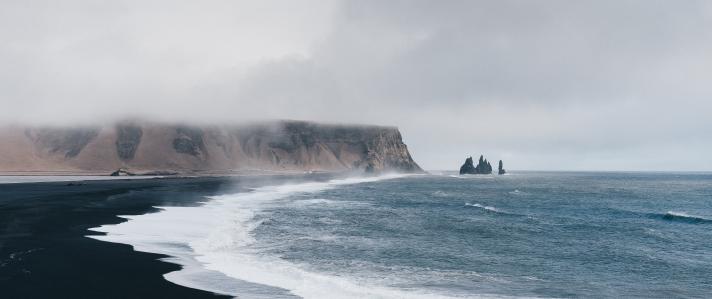Few countries are in a better position to benefit from the blue bioeconomy than Iceland. For much of its modern history, the North Atlantic nation’s economy relied on the sea. Fish and fish products still make up about 40% of Iceland’s commodity exports. Direct employment in fisheries stands at about 8,000, according to Statistics Iceland, but once fishing-related activities are factored in, the number of employees is likely to exceed 30,000 – or about 17% of the workforce in this country of fewer than 350,000 people.
Those fishing-related activities increasingly include blue bioeconomy ventures that seek to maximise the value of fish waste and fishery by-products. Iceland’s government has not yet developed a formal blue bioeconomy strategy, but various Icelandic projects, start-ups and initiatives are underway that aim to find new ways to use existing resources or turn marine biowaste into new commodities.
One prominent venture is the Iceland Ocean Cluster (IOC), a private-sector initiative founded by Thor Sigfusson that helps out innovative new projects and provides consultancy and networking services. The basic aim of the IOC, according to Sigfusson, is to achieve 100% fish utilisation. Currently in Europe, only 50%-60% of each fish caught is used, with the rest discarded as waste. In Iceland, the utilisation rate already stands at 80%, helped by the integrated nature of the country’s fishing and processing industries. In the last quarter of century, there has been a huge jump in the use of by-products from Icelandic fisheries, creating some 700 jobs in Iceland and a market value of about $500 million, according to IOC.
To push up the utilisation rate even higher, IOC and Haustak, a fish-drying company that sends most of its products to Nigeria, in 2012 established Codland, a company that develops new products from unused parts of codfish. Product lines include calcium supplements from fish bones, omega-3 rich oil, animal feed and marine collagen, which as a supplement can reduce skin aging and maintain joint health. Other IOC spin-offs include Margildi, a small company that developed an innovative refining method for omega-3 fish oil from herring and mackerel, and the Feel Iceland brand, which sells skincare products derived from marine collagen.
IOC has also mapped the companies in Iceland working in the area of seafood processing and byproducts, counting more than fifty. Further examples include Zymetech, which extracts enzymes from cod for cosmetic and medicinal use, and refined fish oil company Lysi.
Meanwhile, Iceland’s government has recognised that innovation is essential to its ocean-going economy, and that relying on a traditional view of fisheries is unlikely to be sustainable at a time when fish stocks must be carefully conserved to prevent their collapse, and the seas face the threats of pollution and global warming. Iceland therefore supports blue bioeconomy research, including through research cooperation with the European Union. Iceland is a partner in the Blue Bioeconomy Cofund, which also involves Norway and 14 coastal EU countries, and receives support from EU research funds. The Cofund will provide finance to projects working to find new ways to derive value from the blue bioeconomy. It began a project selection process in late 2018 with a call for pre-proposals, and the first funded projects should start work in early 2020.
Iceland was also instrumental in establishing a Nordic Bioeconomy Programme under the intergovernmental Nordic Council of Ministers. The programme provides funding for bioeconomy projects and supports, for example, the Sureaqua project, which is establishing a centre of excellence to promote bioeconomy collaboration in the Nordic region. The Icelandic partners in Sureaqua, which runs until 2022, are environmental research company Rorum, salmon farmers Arnarlax and the Iceland Ocean Cluster.
On the international front, Iceland also promotes the idea of the blue bioeconomy at the Arctic Council, an intergovernmental forum for cooperation between Arctic countries. The council’s members are Canada, Denmark, Finland, Iceland, Norway, Russia, Sweden and the United States. Iceland holds the chairmanship from 2019 to 2021. Iceland’s emphasis as chair of the council will be on sustainable development in the Arctic, where temperatures are rising as a consequence of global warming at twice the global average.
One of the sustainable development priorities will be establishment of a project on the blue bioeconomy in the Arctic, to promote greater efficiency in the utilisation of marine resources. According to Einar Gunnarsson, Iceland’s ambassador for Arctic affairs, the blue bioeconomy is “back to basics thinking in the sense that it’s about making the most of what you get.” Through the Arctic Council, Iceland will push its message on using 100% of the biomass taken from the sea and finding new uses for the parts of the fish normally thrown away as waste.
Further information:
Thor Sigfusson, founder of the Iceland Ocean Cluster, has written a book, The new fish wave, setting out a vision for the blue bioeconomy, providing lessons on establishing ocean sustainability clusters, and detailing the 100% fish utilisation goal. The book, published by Leete's Island Books (United States), will be available in April 2020 at http://www.sjavarklasinn.is

